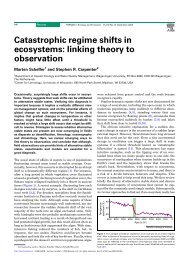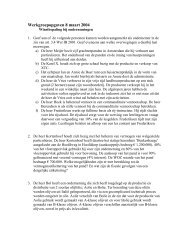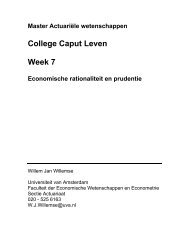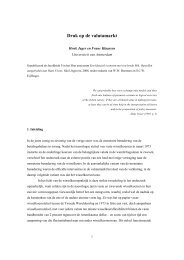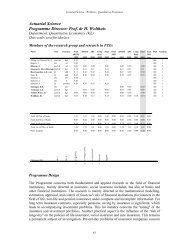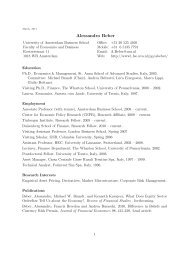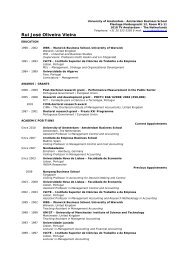A meta-analytically derived nomological network of procrastination
A meta-analytically derived nomological network of procrastination
A meta-analytically derived nomological network of procrastination
Create successful ePaper yourself
Turn your PDF publications into a flip-book with our unique Google optimized e-Paper software.
1412 W. van Eerde / Personality and Individual Differences 35 (2003) 1401–1418<br />
model <strong>of</strong> affective well-being at work. In addition to the commonly found factors, negative and<br />
positive affectivity, five lower order factors were presented. Two <strong>of</strong> these factors have been<br />
researched in relation to <strong>procrastination</strong>: Anxiety–comfort and depression–pleasure. In contrast,<br />
the three remaining factors, anger–placidity;boredom–enthusiasm;and tiredness–vigour have<br />
been neglected. Particularly the latter two would seem to be important to investigate with respect<br />
to <strong>procrastination</strong>.<br />
Also, an important field <strong>of</strong> study is <strong>procrastination</strong> in groups, because student and work groups<br />
are <strong>of</strong>ten used for increasingly complex tasks. Questions such as ‘do groups regulate <strong>procrastination</strong><br />
<strong>of</strong> their members?’, ‘is social loafing the same as <strong>procrastination</strong>?’, or ‘is <strong>procrastination</strong> a<br />
phenomenon at the group level?’ would be interesting to answer in future research.<br />
A different approach to studying <strong>procrastination</strong> may lead to more specific insights that can be<br />
used in interventions, be it by training or reorganizing tasks, teams, or procedures, to overcome<br />
the dysfunctional aspects <strong>of</strong> <strong>procrastination</strong>, and perhaps enhance potential functional aspects.<br />
In everyday life, deadlines are extremely important, and where there are deadlines, people procrastinate.<br />
A realistic view on <strong>procrastination</strong> is more important than a moral judgment. Instead<br />
<strong>of</strong> labelling persons procrastinators and nonprocrastinators, it would be wiser to think <strong>of</strong> contextual<br />
and process variables that induce <strong>procrastination</strong> and that moderate the outcomes. Future<br />
studies should reflect this more <strong>of</strong>ten. Although the results <strong>of</strong> this <strong>meta</strong>-analysis provides insight<br />
into individual differences, a more comprehensive theoretical framework <strong>of</strong> <strong>procrastination</strong> is still<br />
needed.<br />
Appendix. Studies included in the <strong>meta</strong>-analysis<br />
*Beck, B. L., Koons, S. R., & Milgrim, D. L. (2000). Correlates and consequences <strong>of</strong> behavioral<br />
<strong>procrastination</strong>: the effects <strong>of</strong> academic <strong>procrastination</strong>, self-consciousness, self-esteem,<br />
and self-handicapping. In J. R. Ferrari, & Pychyl, T. A. (Eds.), Procrastination: current issues<br />
and new directions (special issue). Journal <strong>of</strong> Social Behavior and Personality. 15, 3–13.<br />
*Berzonsky, M. D., & Ferrari, J. R. (1996). Identity orientation and decisional strategies. Personality<br />
and Individual Differences, 20, 597–606.<br />
*Beswick, G., & Mann, L. (1994). State orientation and <strong>procrastination</strong>. In J. Kuhl, & J.<br />
Beckmann (Eds.), Volition and personality: action versus state orientation (pp. 391–396). Seattle:<br />
Hogrefe & Huber.<br />
*Beswick, G., Rothblum, E. D., & Mann, L. (1988). Psychological antecedents <strong>of</strong> student <strong>procrastination</strong>.<br />
Australian Psychologist, 23, 207–217.<br />
*Blunt, A., & Pychyl, T. A. (1998). Volitional action and inaction in the lives <strong>of</strong> undergraduate<br />
students: state orientation, <strong>procrastination</strong>, and proneness to boredom. Personality and Individual<br />
Differences, 24, 837–846.<br />
*Bridges, K. R., & Roig, M. (1997). Academic <strong>procrastination</strong> and irrational thinking: a reexamination<br />
with context controlled. Personality and Individual Differences, 22, 941–944.<br />
*Burns, L. R., Dittmann, K., Nguyen, N. L., & Mitchelson, J. K. (2000). Academic <strong>procrastination</strong>,<br />
perfectionism, and control: associations with vigilant and avoidant coping. In J. R. Ferrari,<br />
& T. A. Pychyl (Eds.), Procrastination: current issues and new directions (special issue).<br />
Journal <strong>of</strong> Social Behavior and Personality. 15, 35–46.




